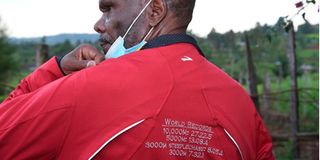Henry Rono: From frying pan into fire?

Legendary athlete Henry Rono, shows the four world records he broke emblazoned on his jacket during an interview with Nation Sport at his home in Kaptargon village, Nandi County on April 7, 2021.
What you need to know:
- Two years after returning home former athletics star still suffering
- He needs help, especially medical, says younger brother Meli, who is housing fallen legend
- Two-time Boston Marathon champion Moses Tanui maintains that an athletes’ welfare fund is the best way forward.
On November 21, 2019, distance running legend Henry Rono landed at Nairobi’s Jomo Kenyatta International Airport, happy to be back home after 33 roller-coaster years in the United States of America.
Rono, 69, flew back home after successfully battling alcoholism, a condition that rendered him virtually homeless and with nothing to show for his illustrious professional running career that saw him break five world records, four of these in an 81-day blitz in 1978.
His air tickets from Albuquerque, New Mexico -- where he worked as a porter at the local airport – were purchased by his home county of Nandi.
Torn apart from his wife and two children by the tipple, and without access to his vast estate, which includes a 100-acre tract of land in Molo, Rono currently lives with his younger brother David Meli, who took him into his own home at their ancestral village in Kitparagon, which is in the athletics-rich area of Kabirirsang.
The area is home of, among others, former 800 metres world champions Wilfred Bungei and Janeth Jepkosgei.
Rono says he has been sober for the last six years now, after leaving rehab for the last time in 2015.
“Life was difficult and that’s why I went into full-time drinking,” he told Nation Sport at his home on Wednesday.
“But they realised I was not into alcohol, and was only using alcohol just to escape from frustrations.
“There was high demand on me from sports, and managers wanted to manage my running for their own selfish reasons.
“And that’s part of the reason why athletes in Kenya are getting into using drugs and banned performance-enhancing substances,” he reflected.
The legend’s brother says Rono needs urgent medical attention and something to keep him busy, adding that, as his brother, the least he could do was take him in after his return from a troubled stay in USA.
“He’s my brother after all, and the least I could do is take him in,” Meli said.
“But he needs help, especially medical, because doctors say he seems to be suffering from long-term effects of living in a polluted surrounding. Medical diagnosis indicate that he has a heart condition and problems with pressure associated to the pollution. We will be grateful for any help.”
Athletics Kenya President Jack Tuwei, Nandi County Sports Officer Kennedy Tanui and marathon legend Moses Tanui all agree that it needs a concerted effort to assist Rono and other Kenyan legends, even those who may have made unwise life decisions.
“Rono has been away for a long time and he needs a lot of encouragement and support,” Tuwei said on Saturday.
“Athletics Kenya is looking at ways of helping him and other legends, but even then, it should be a collective effort and county governments need to also help, as these legends are their own and live within their counties,” he added.
Kennedy Tanui assured that in the next financial year, the County Government of Nandi will allocate funds to extend a lifeline to Rono and other legends.
“We will engage Rono and others on consultancy basis to talk to and mentor the young athletes. Finances have been a major issue in the counties, but we shall make necessary arrangements in the next financial year from June.
“We bought Rono the tickets back home, and we also appeal to corporates and successful retired athletes to join us in cushioning these legends,” he adds.
Two-time Boston Marathon champion Moses Tanui maintains that an athletes’ welfare fund is the best way forward.
“Unfortunately, with the politics in sports, we can’t do much. We have tried before to form a welfare group but the idea was shot down due to politics,” Tanui, the first man to run a sub one-hour half marathon said.
“We need a national fund that will support retired athletes who meet certain criteria, for example having represented the country at the World Championships, Olympic Games, Commonwealth Games, etc.”





